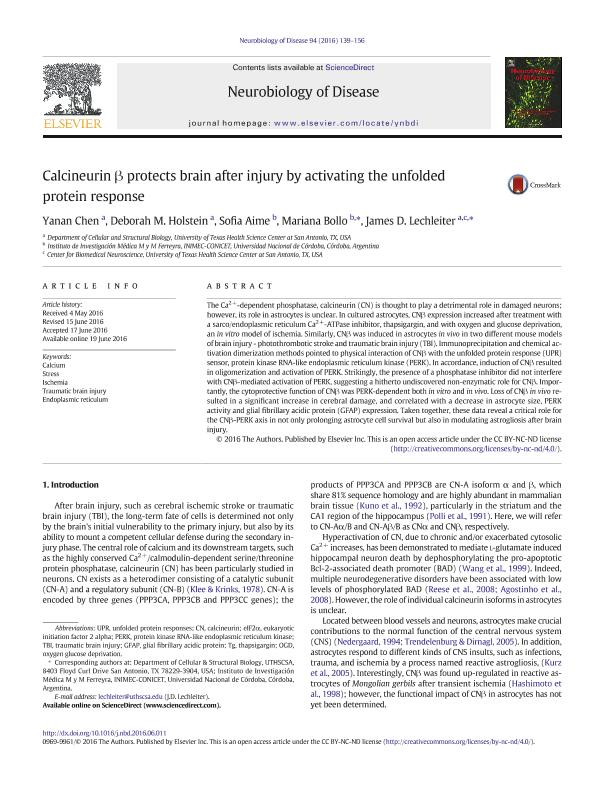Artículo
Calcineurin β protects brain after injury by activating the unfolded protein response
Fecha de publicación:
10/2016
Editorial:
Academic Press Inc Elsevier Science
Revista:
Neurobiology of Disease
ISSN:
0969-9961
Idioma:
Inglés
Tipo de recurso:
Artículo publicado
Clasificación temática:
Resumen
The Ca2 +-dependent phosphatase, calcineurin (CN) is thought to play a detrimental role in damaged neurons; however, its role in astrocytes is unclear. In cultured astrocytes, CNβ expression increased after treatment with a sarco/endoplasmic reticulum Ca2 +-ATPase inhibitor, thapsigargin, and with oxygen and glucose deprivation, an in vitro model of ischemia. Similarly, CNβ was induced in astrocytes in vivo in two different mouse models of brain injury - photothrombotic stroke and traumatic brain injury (TBI). Immunoprecipitation and chemical activation dimerization methods pointed to physical interaction of CNβ with the unfolded protein response (UPR) sensor, protein kinase RNA-like endoplasmic reticulum kinase (PERK). In accordance, induction of CNβ resulted in oligomerization and activation of PERK. Strikingly, the presence of a phosphatase inhibitor did not interfere with CNβ-mediated activation of PERK, suggesting a hitherto undiscovered non-enzymatic role for CNβ. Importantly, the cytoprotective function of CNβ was PERK-dependent both in vitro and in vivo. Loss of CNβ in vivo resulted in a significant increase in cerebral damage, and correlated with a decrease in astrocyte size, PERK activity and glial fibrillary acidic protein (GFAP) expression. Taken together, these data reveal a critical role for the CNβ-PERK axis in not only prolonging astrocyte cell survival but also in modulating astrogliosis after brain injury.
Palabras clave:
Calcium
,
Endoplasmic Reticulum
,
Ischemia
,
Stress
,
Traumatic Brain Injury
Archivos asociados
Licencia
Identificadores
Colecciones
Articulos(INIMEC - CONICET)
Articulos de INSTITUTO DE INV. MEDICAS MERCEDES Y MARTIN FERREYRA
Articulos de INSTITUTO DE INV. MEDICAS MERCEDES Y MARTIN FERREYRA
Citación
Chen, Yanan; Holstein, Deborah M.; Aime, Sofía; Bollo, Mariana Ines; Lechleiter, James D.; Calcineurin β protects brain after injury by activating the unfolded protein response; Academic Press Inc Elsevier Science; Neurobiology of Disease; 94; 10-2016; 139-156
Compartir
Altmétricas




